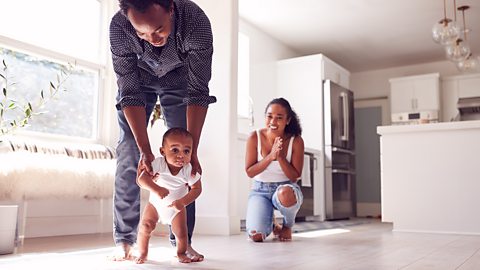Learning to roll, sit up, stand and walk are all big milestones for your baby.
As a parent, you might be anxiously waiting for your baby to reach these major moments and wondering when they will happen. Sometimes this anticipation comes with worry about your baby or child's development.
We worked together with the to answer your most frequently asked questions about your baby or child's physical development.
Learning these new skills isnβt easy for babies or children and can sometimes cause them to get upset and cry. This can be hard for you too, so remember to ask family and friends for support, or speak to your health visitor or GP for advice.
Reaching developmental milestones may take a little longer for premature babies (those born before 37 weeksβ gestation), by comparison to babies born at full term. This is because they are younger. Your baby will be assessed according to their βcorrected ageβ. This is your babyβs age from your due date, rather than the day they were born.

When should my baby roll over?
Most babies start to roll at around 6-months-old. If your baby is 6 months of age and doesnβt roll, itβs a good time to ask your health visitor for advice.
Here are some top tips, to help encourage your baby to roll:
- Tummy time on the floor will help your baby and encourage them to roll, as it strengthens their muscles.
- When your baby is on their back, place toys alongside for them to try and reach.
- Lying your baby on their side when they are awake and lying next to them is another way to support them to roll. You can talk or sing to baby, making it a fun activity that also encourages gentle movement.
Should I worry that my child canβt hold themselves up?
Itβs important to remember that all babies develop at different rates.
Babies can usually stand when held at 7-months-old when your baby has good head control and balance.
Donβt worry if your baby curls their toes at this stage, itβs just to help with their balance.
Giving your baby plenty of time to play on the floor and allowing them to try and weight bear is the best way to start. Avoid using baby walkers or bouncers, as they can delay these developmental milestones.
If your baby is struggling to stand with support at 7 months, or you have other worries about their development please speak to your GP or health visitor.
When will my baby sit up?
At around 8 months, you might notice that your baby is getting better at controlling their muscles and can hold their head up and sit up.
To help your baby to sit, place your baby in a sitting position with their hands on the floor or their legs for support.
You can then help them keep balanced in this position β for a short time only to start with. Itβs also best if no toys are nearby, as your baby might reach for them and topple over.
If your baby is not able to sit up by 8 months, please contact your GP or health visitor.
When will my baby start to walk?
Most toddlers can walk unaided by the time they reach 18-months-old.
Sometimes there are factors which may delay children from walking, such as the use of baby walkers, if your baby is a proficient bottom shuffler, or if your baby has been unwell or in hospital for a prolonged period.
Keeping barefoot when indoors can help children gain the confidence to remain on their feet for longer.
Offering lots of praise, even when your child only takes a couple of steps, will reinforce the idea that walking is much more fun!
Give your child plenty of time on the floor to explore and avoid using a walker, or similar βwalking aidsβ, as these can cause over-reliance on support and do not encourage the correct muscles or movement in the legs.
Find out how babies build up to their first steps.
If your child hasnβt started walking by 18 months, speak to your GP or health visitor. They will look into how your child is developing and offer more support and advice if needed.
Should I be worried about tiptoe walking?
Tiptoe walking is when children walk or stand predominantly on their tiptoes, and it is relatively common in young children.
It is common for children aged between 10 and 18 months to walk on tiptoes when they are learning to walk, as it helps with their balance. It is common for children aged three and under to tiptoe walk. If you have concerns, please talk to your health visitor or GP.
At the age of 3 years, toddlers will be able to run at speed, jump, climb slides in the park, pedal a tricycle, kick and throw a ball, and balance for a few seconds on either leg! For toddlers to achieve these amazing skills, they need to have opportunities to practise them regularly. Your toddler will need space and different places to explore and help them develop their physical skills.
If your child is unable to do any of the activities below, it is recommended that you make an appointment with your GP:
- jump
- squat or stand with their heels on the floor
- stand from sitting on the floor without using their hands
If your child is experiencing any pain whilst walking, is tripping frequently, or you have noticed their walk has changed recently, or you have concerns that your child is not meeting their milestones, contact your health visitor or GP for advice.






